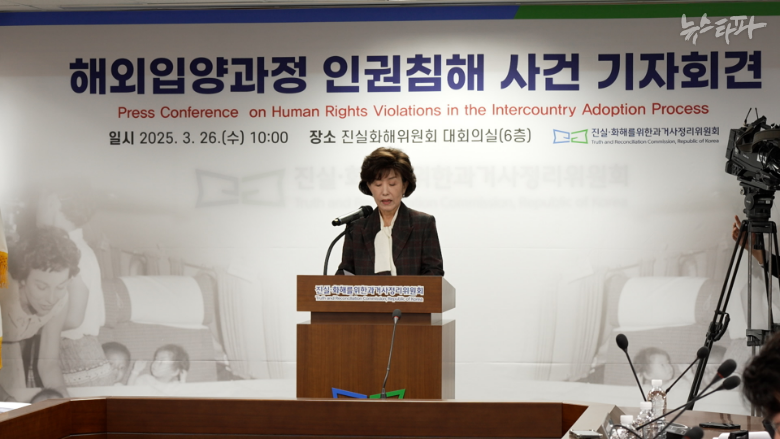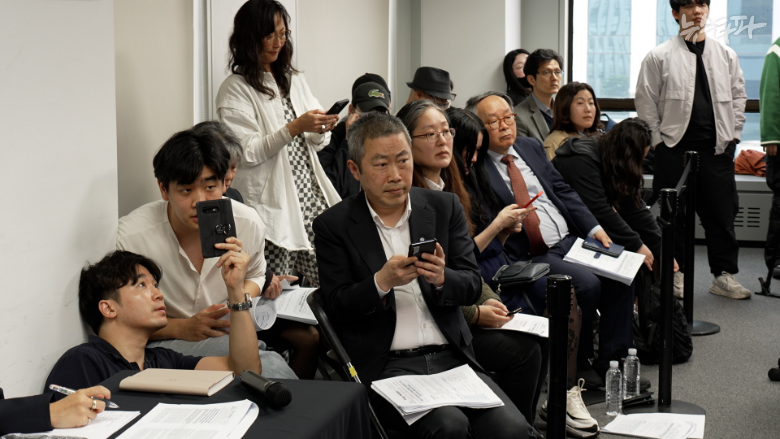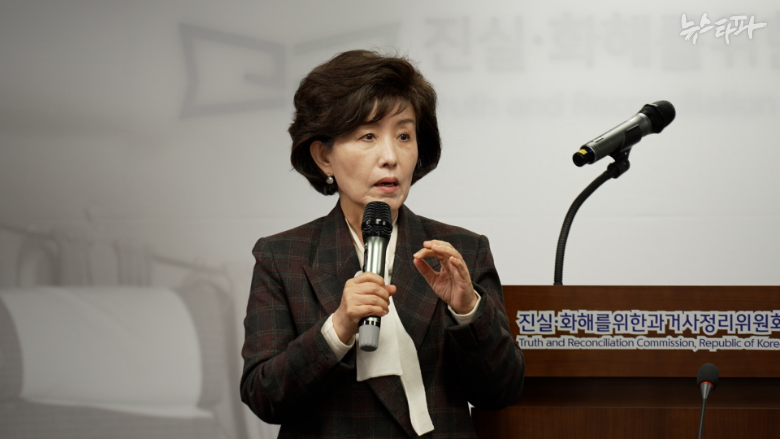Korean TRC Acknowledges State Violence against Overseas Adoptees, but Limits Remain
South Korea’s Truth and Reconciliation Commission(TRC) has confirmed some of the overseas adoption cases from the 1970s and 1980s as human rights violations and recommended the Korean government to officially apologize to its victims. It is the first time for a government agency to recognize human rights violations in past overseas adoptions and acknowledge the state’s responsibility.
The commission’s decision includes illegal donation practices exposed earlier by the Korea Center for Investigative Journalism(KCIJ)-Newstapa. Newstapa’s investigation shed light on how certain adoption agencies had increased the business profitability of overseas adoption by forcing donations from adoptive parents and had them as unofficial income sources. By forcing donations, Korean adoption agencies were able to take an amount of money that exceeded the standard adoption fee set per child.
The commission’s decision is significant as it officially acknowledges the human rights violations experienced by Korean-born overseas adoptees. However, the announcement immediately faced criticisms due to its limitations.
TRC’s findings of 2.5-year-investigation

▲Park Sun-young, chairperson of the commission, is announcing the conclusion of the investigation on March 26.
The TRC held a press conference on March 26 at the commission’s office in Seoul to announce the findings of its investigation into human rights violations involving overseas adoptions of Korean children. Its decision means an applicant is recognized as a victim of state violence.
The TRC investigation began in 2022 as hundreds of overseas adoptees applied for truth findings on their illegal adoption cases. A total of 367 Korean-born overseas adoptees had applied since then until 2023. After a lengthy investigation that lasted two years and seven months, the commission recognized human rights violations in 56 cases among those applicants.
The commission had gathered adoption records from the country’s so-called ‘four major adoption agencies’ - namely, Holt International, Korea Social Service (KSS), Eastern Social Welfare Society (EWS), and Korea Welfare Services (KWS). Moreover, its investigators conducted interviews with a diverse group of witnesses including public officials who were in charge of the overseas adoption process, and staff members from adoption agencies as well as welfare facilities. They also spoke with the biological families of the applicants.
The commission criticized the Korean government for taking economic advantage of overseas adoption and neglecting the oversight and management obligations while leaving the adoption work in the hands of private adoption agencies. Also, it accused the government of turning a blind eye to the malpractices of the adoption agencies, thus paving the way for a large number of helpless children to be sent abroad -- depriving them of the rights guaranteed under the Constitution and the United Nations’ Convention on the Rights of the Child.
Newstapa’s earlier findings included in TRC conclusions
In 2023, following an in-depth investigation into the human rights violations experienced by Korean-born adoptees, KCIJ-Newstapa published an investigative series titled “Overseas Adoption and Money,” which consisted of 10 articles (See below for links).
In this series, KCIJ-Newstapa not only exposed problems of falsified or fabricated adoption papers, it also uncovered how Korean adoption agencies profiteered by forcing prospective adoptive parents to pay donations, in addition to taking standard adoption fees. According to Newstapa’s investigation, certain adoption agencies were able to make money that was three to four times more than the standard fee set for a single adoption case.
The commission concluded that during the 1970s and 1980s, numerous human rights violations occurred due to illegal practices in the overseas adoption process. The TRC investigators found out that overseas adoptions were carried out without the legal consent of biological parents, and fake documents, such as “orphan hojuk or birth registration,” were falsely created to send children abroad without official records.
They also pointed out that a public notice procedure for searching parents or guardians of a missing child had remained only perfunctory at that time. Moreover, Korean adoption agencies were found to have deliberately switched children’s identity in cases where a child died during the adoption process only to quickly substitute another child for adoption.

▲Overseas adoptees are listening to the TRC’s announcement.
As of 1984, the Korean Ministry of Health and Welfare was responsible for screening prospective adoptive parents for their eligibility to adopt a child. At that time, however, the number of overseas adoptions in Korea exceeded 8,000 cases per year making the screening process carried out poorly. Furthermore, while Korean adoption agencies were required to fulfill a guardian role to ensure the adopted children could settle well with their new families, they failed to do so.
Instead, the adoption agencies simplified the adoption process in order to send more children to overseas countries where there was high demand. The Korean government, in turn, overlooked the adoption agencies exacting donations from adoptive parents.
Following is the list of eight human rights violations confirmed by the TRC involving overseas adoption: Lack of proper consent for adoption; fabrication of records including false reports of abandoned child; tokenistic public notice for guardians; deliberate identity substitution; inadequate screening of adoptive parents; neglect of guardianship duties; mass exportation of children to meet demand; forced donations for adoption placement.
The TRC’s recommendations included an official state apology; a comprehensive survey on adoptees’ citizenship status and provision of follow-up policy measures; remedies for victims whose identities were falsified; improvement in the system to provide adoption records; practical support for reunions between adoptees and their biological families; prompt ratification of the Hague Convention on Protection of Children and Cooperation in Respect of Intercountry Adoption.
Peter Møller, co-representative of the Danish Korean Rights Group(DKRG) viewed the TRC decision as a historic milestone.
“It is a milestone where the truth finally comes to light, and a milestone where we can begin to heal the wounds that have shaped the lives of many adopters for decades,” he said during his case presentation during the press conference.
Conflicting voices within TRC revealed over its results

▲Park Sun-young, the chairperson of the commission.
However, adoptees expressed mixed feelings about the commission's decision. On one hand, they welcomed the decision as the results had been long awaited by the adoptees. On the other hand, they expressed regret because there were clear limitations to the commission's investigation process and results. Soon after they announced the results, the commission had to face harsh criticisms.
Despite a lengthy investigation spanning two years and seven months, the commission’s decision was made on only 98 out of 367 cases. It was also revealed during the later part of the press conference that 42 out of the 98 cases have been put on hold, meaning the TRC has postponed to determine whether they qualify as victims or not. The day before the press conference, on the 25th, the commission convened to review the 98 overseas adoption cases. In that meeting, five out of nine members decided to withhold rulings on the 42 cases citing lack of evidence.
Lee Sang-hoon, a TRC standing commissioner, who led the Q&A session at the press conference, publicly expressed regret over the commission’s decision.
“I personally find yesterday's decision regrettable and incomplete. I cannot agree with it,” Lee said. “For decades, various illegalities and violations have occurred due to the state's neglect. But does it make sense for the commission to screen out who qualifies as victims and quantify their suffering?”
Park Sun-young, chairperson of the commission, was one of the five members who supported the decision to postpone. Reporters asked why she supported the decision to put 42 cases on hold.
“In general, the documents were insufficient,” Park responded. “There should be a clear standard when determining whether a case can be confirmed.”
The fact that many overseas adoptions were based on falsified documents or fabricated identity makes it difficult to distinguish what can be viewed as authentic information and what is not. Considering how it is an inherent and overarching problem, the TRC’s conclusion—that applicants’ lacking records acts as an obstacle for some adoptees to be confirmed as victims— could be unsatisfactory to many.
Kim Do-hyun, co-chairman of Ko-Root, a civic group that supports overseas adoptees, expressed regret over the result.
“The lack of documents (to prove the biological parents of overseas adoptees) itself means that the adoption is a huge human rights violation,” Kim said.
Han Boon-young, co-representative of DKRG, who attended the press conference and spoke as a participant, was also not recognized as a victim due to “insufficient documents.”
“The lack of documents is at the core of what’s wrong with the adoption process.This lack of documents must not make us victims for the second time. Destruction and withholding of our documents must not leave us open to eternal uncertainty,” Han stated.
Referring to the more than 200 cases still pending at the TRC, she emphasized, “Many cases are still under investigation. I urge the Truth and Reconciliation Commission to fully acknowledge the state's responsibility for all human rights violations that occurred during the overseas adoption process.”
Another overseas adoptee, Kim Yu-ri, who also attended the conference, criticized the commissions’ recommendations and urged them to provide practical support for adoptees.